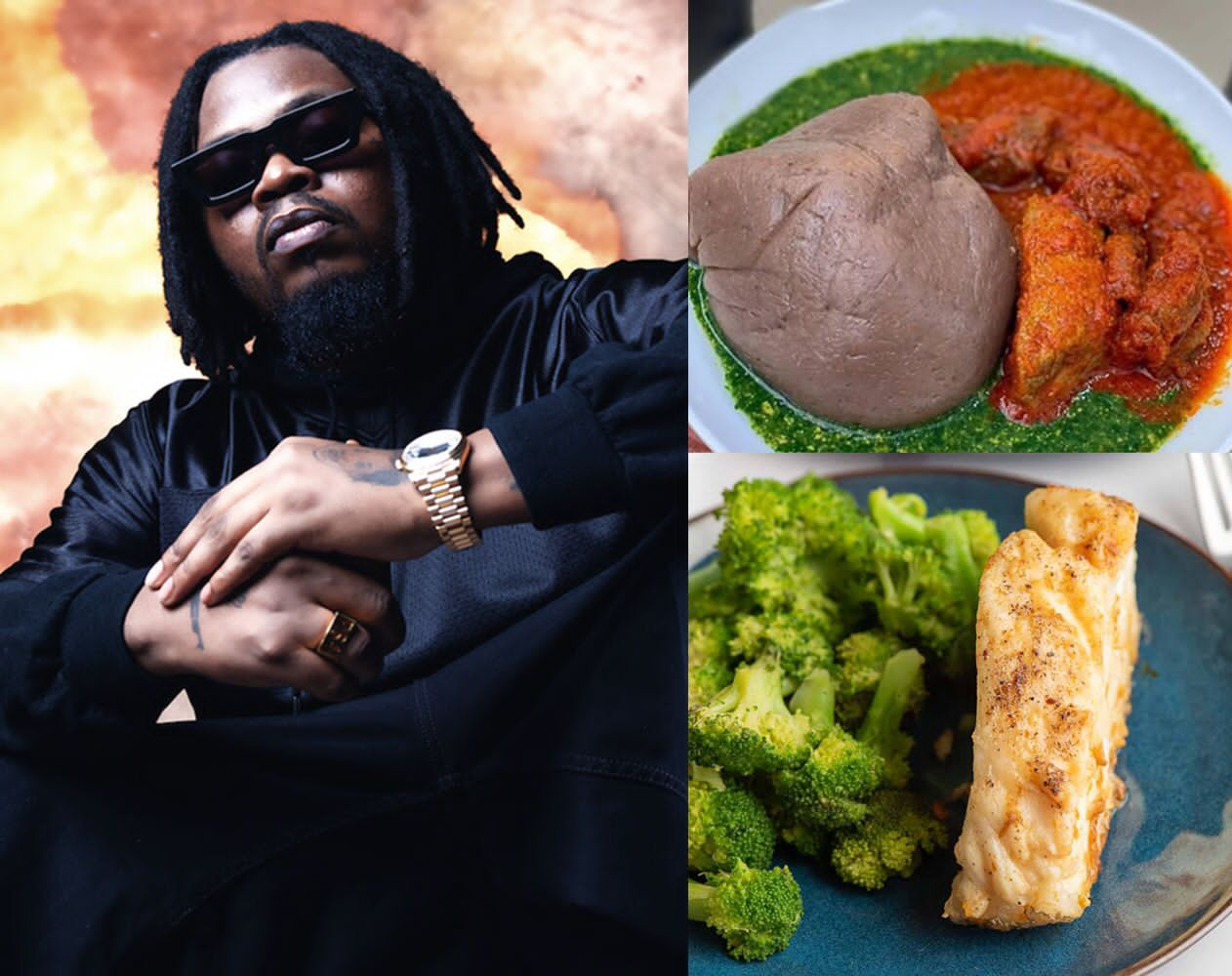
“Amala Makes Me Bloated All Day” — Olamide Ditches Traditional Meal for Broccoli and Light Diet

In a surprising revelation that has sparked both amusement and debate across social media platforms, Nigerian rapper and music icon, Olamide Adedeji, has opened up about a personal change in his eating habits. During an impromptu conversation with fans at an event in Lagos over the weekend, the YBNL boss casually mentioned that he no longer eats amala—a staple Yoruba delicacy—because it leaves him feeling bloated for hours. Instead, the chart-topping artist says he now opts for healthier, lighter options like broccoli and other vegetables, noting that the change has drastically improved how he feels throughout the day.
The statement, though seemingly harmless, instantly went viral. “I used to eat amala regularly, but it makes me bloated all day. I don’t like how it sits in my stomach. These days, I stick to broccoli, carrots, and light foods. I feel lighter and more active,” he said, much to the shock of fans who’ve often associated him with strong cultural pride and traditional tastes.
Olamide’s confession has not only triggered laughter and memes but has also ignited a broader conversation about evolving diets, health consciousness among Nigerian celebrities, and the silent shift many public figures are making toward wellness-focused lifestyles. For many fans who grew up watching the rapper celebrate Yoruba culture through his music, his dietary shift feels almost symbolic—like an unspoken declaration that the old ways are making room for the new, even at the dinner table.
His admission comes at a time when more Nigerians, especially those in urban areas, are beginning to explore healthier dietary options. The rise of fitness influencers, nutritionists on Instagram, and the increasing accessibility of foreign produce like broccoli, quinoa, and asparagus at supermarkets have all contributed to a subtle but noticeable change in food preferences among the middle and upper classes. In this context, Olamide’s preference for vegetables like broccoli—once considered elite or foreign—has amplified discussions about class, identity, and modern eating habits in Nigeria.
Reactions online have ranged from supportive to outright hilarious. One user wrote, “Olamide don turn Broccolide. No more amala and ewedu. Wahala for who still dey chop swallow for night.” Another joked, “Even Baddo don dey fear bloating. Na to carry my vegetables serious now.” Others have used the moment to reflect on their own health journeys, sharing their struggles with traditional heavy meals and how changing their diet improved their well-being.
Despite the mixed reactions, nutritionists say Olamide’s experience is not uncommon. According to Lagos-based dietician Temitope Aluko, many traditional Nigerian meals, particularly heavy swallows like amala, fufu, and eba, can cause bloating and discomfort if not balanced properly. “It’s not that amala is bad,” she explains, “but portion control, food combination, and timing play a major role. Some people have more sensitive digestive systems. Light vegetables like broccoli, cabbage, and carrots are easier to digest, and they provide high fiber and essential nutrients without making you feel sluggish.”
Beyond the health talk, there’s also an undercurrent of cultural tension in Olamide’s comment. For some fans, the idea of the legendary indigenous rapper replacing amala—often viewed as a badge of cultural identity—with broccoli, a Western import, felt like a minor betrayal. “First it was afrobeat artistes sounding like Americans, now it's our food too?” one user tweeted with a laughing emoji. However, others have defended Olamide’s right to prioritize his health, emphasizing that personal wellness should not be politicized or policed.
Indeed, Olamide’s music has always embodied the balance between street credibility and forward-thinking creativity. Known for mixing Yoruba slang with global sounds, he’s never been afraid to evolve. From gritty street anthems to pop-infused hits, and now, from amala to broccoli, he continues to redefine what it means to be authentically Nigerian in a fast-changing world.
Interestingly, this isn’t the first time a Nigerian celebrity’s food choices have made headlines. Last year, singer Tiwa Savage confessed she was trying out a vegan diet to help with skin breakouts. Similarly, actor Richard Mofe-Damijo shared his struggles with giving up pounded yam after a health scare. These revelations are shaping a new narrative about how fame, health, and lifestyle intersect in contemporary Nigerian pop culture.
Whether Olamide’s comment was a throwaway remark or a serious declaration of a long-term lifestyle change, one thing is clear—people are paying attention. Food has always been a deeply personal yet communal part of Nigerian identity. It tells stories of roots, traditions, family, and resilience. For a figure like Olamide, whose career is built on cultural pride, the decision to openly move away from a beloved traditional meal is more than just about bloating. It’s about prioritizing self, health, and perhaps, sending a quiet message that it’s okay to change—even when it comes to the things you once loved.
As the social media buzz continues to brew, fans are left both amused and inspired. Some say they’ll try switching to lighter meals. Others insist they’ll stick with their amala regardless of the consequences. But one thing everyone agrees on is that Olamide has once again proven his influence goes beyond music. Whether it's fashion, slang, or now even what’s on the plate, when Baddo speaks, the streets—and the timeline—listen.
As the rapper continues to evolve, many are curious to see what other lifestyle choices he’ll unveil. For now, though, it’s broccoli over amala—and the streets will just have to deal with it.


